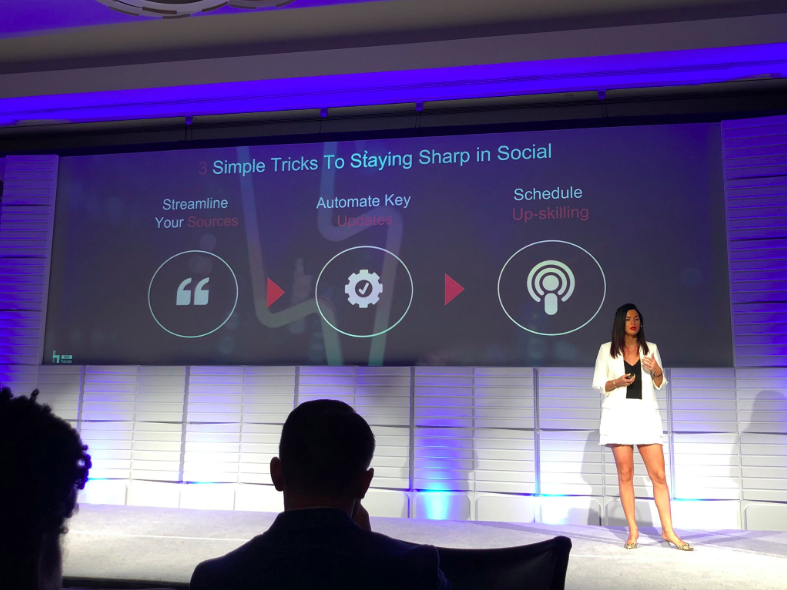by Jacob Gnieski, assistant account executive, Red Havas
In NYC last week, we were all ears at the Meltwater Social Summit, where social media experts from around the country shared the top social strategies driving business results today.
In NYC last week, we were all ears at the Meltwater Social Summit, where social media experts from around the country shared the top social strategies driving business results today.
Our agency is attuned to this topic—it’s something we enjoy working toward every day for our clients—and we’re committed to constant learning in this ever-evolving space. We also had a few things to share. In fact, our own EVP of Social & Integration, Davitha Ghassi, took the stage at the summit to share her insights on the social trends she’s tracking now. We’ll be back on the blog later this week to dig into Davs’ insights. For now, here are our seven top takeaways from our fellow speakers:

1. The summit’s dominant theme: PR and marketing are merging, and social media and data are at the center.
Both John Box, global head of Meltwater Social, and our own Davitha Ghiassi proclaimed that for many brands and organizations, social media is proving to be the driving force behind the integration of PR and marketing teams. And both PR and marketing are benefiting from the insights produced by data-tracked social media metrics and social listening tools.
2. Don’t oversaturate your Instagram content Feed.
For brands, Instagram Stories is the place to be (at this time) versus an over-saturated Instagram Feed, according to Dina Fierro, vice president of global digital strategy and social engagement for NARS Cosmetics. There should be a reason behind each and every post. When it comes to creating and posting content, say “no” more than you say “yes” to maintain brand equity. In general, brand heritage outweighs engagements: Engagements don’t mean anything if they’re not advancing the brands’ key messages. Make sure every post has an intended purpose.
3. Future-proof your social media strategy through smart measurement techniques.
Zontee Hou, senior strategist for Convice & Covert, made a case for measuring your organization’s social media marketing effectiveness to inform your overall strategy. Two metrics every organization should be tracking: social’s impact on sales and its ROI. In a 2019 study by Buffer, 58.8 percent of the marketers surveyed indicated that social media is “very important” to their overall marketing strategy, only 29 percent indicated that social media marketing has been “very effective” for their business. This raises a question: Why do most marketers (58.8 percent) believe that social media is important to their business’ overall marketing strategy, yet not many (29.6 percent) believe that it is “very effective” for their business? This highlights the importance of measurement and the need for marketers to adapt to social’s prominence by implementing strategies that measure and prove its ROI.
4. Because influencer marketing and influencer relations are vital to business, everyone in your organization should have context when it comes to influencer vetting.
This means that when choosing influencers, you should be involving outside team members in discussions. This point was central to a presentation by Burson, Cohn & Wolfe’s Matt Kelly, Rosa Nunez and Torre Gentile. They argued that it’s important to make sure representatives from your target audience are in the room with you and involved in influencer vetting conversations when designing a campaign. Especially when it comes to conversations around diversity and inclusion, context matters. Influencer marketing is a $1.5 billion industry: 65 percent of brands intend to increase their spending on influencers over the next 12 months to: increase brand awareness (86 percent); reach new audiences (74 percent); and improve brand advocacy (69 percent).
5. Covered in multiple sessions, the marriage of blockchain technology and social media was a popular theme.
We heard it explored not only in Red Havas’ presentation but by Kyle Schlapkohl and Paul Turnbull from IBM Blockchain. Blockchain is becoming increasingly popular across social, and we’re beginning to see the integration of social media and blockchain. In fact, Facebook recently released its plans to launch its own rival to bitcoin. In terms of blockchain chatter on the internet, there’s been a 430 percent spike among blogs in the past three months.
6. Reddit can be an important and useful social media tool for PR and marketing teams.
Reddit is the sixth most visited website in the U.S., with 542 million visitors in March 2019. A full 54 percent of the user-base traffic comes from the U.S., while 8 percent comes from the U.K. and 6.3 percent comes from Canada. Moreover, Reddit users are highly engaged, as Meltwater Social’s Lance Concannon pointed out. In one study, social media users of specific platforms were tracked based on how much time they spend on their most used social media platform. As it turns out, Reddit users spend the most time per day on their site compared to Facebook, Twitter, and YouTube: Reddit (12:18 minutes per day); Facebook (9:57 minutes per day); YouTube (8:58 minutes per day); and Twitter (6:08 minutes per day).
7. Data privacy is more important today than it’s ever been.
Get your data ducks in a row by investing in a data privacy program, said W20’s Dan Linton. As marketers we should know and document all of the following: what data we’re collecting, why we’re collecting it, where it’s coming from, how it’s stored, how we’re using it, records of consent and how people can opt out or be deleted.
Watch this space for our upcoming post on more of the themes driving the evolution of the social media landscape.



